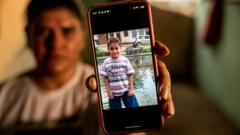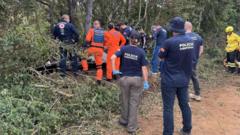The UK courts will decide the liability of BHP in the catastrophic Mariana dam collapse, which claimed 19 lives and caused irreversible environmental damage in Brazil in 2015. Survivors reflect on their losses and the quest for fair compensation amidst the ongoing legal battle.**
Seeking Justice: UK Trial Kicks Off for Brazil’s Mariana Dam Catastrophe Survivors**

Seeking Justice: UK Trial Kicks Off for Brazil’s Mariana Dam Catastrophe Survivors**
Survivors of the tragic Mariana dam collapse gather in London as a landmark trial begins against BHP, the parent company of Samarco, seeking accountability and justice for their lost lives and communities.**
The haunting memories of the Mariana dam collapse still linger in the hearts of many as survivors convene for a pivotal trial against BHP, a major player in the mining disaster that transpired in Minas Gerais, Brazil, on November 5, 2015. Gelvana Rodrigues tragically lost her seven-year-old son, Thiago, who was among the 19 casualties when toxic sludge inundated their home, leaving behind a trail of devastation.
"I spent three days not eating or sleeping; I just wanted to find my son," Gelvana recalls, her grief palpable. The dam, owned by Samarco—a collaboration between mining giants Vale and BHP—broke, releasing an estimated 60 million cubic meters of toxic waste that obliterated entire communities. As the trial commenced on October 21 in London, Gelvana symbolizes the plight of the 620,000 claimants seeking justice and compensation from BHP, as lawyers argue the case should be held in the UK due to the company's then-headquarters location.
For Marquinhos Muniz, a lifelong resident of Bento Rodrigues, the disaster transformed his beloved hometown into a ghostly shell of its former self, with only remnants of his house peeking out from what was once solid ground. "I never imagined this could happen," he states, reflecting on his almost thirty-year affiliation with Samarco. Now he worries his cultural roots will vanish in the newly constructed settlement of Novo Bento, where only 100 of the displaced have begun to resettle.
While the Renova Foundation, supported by BHP and Vale, claims to have distributed over $7.7 billion in reparations to survivors, many, like Marquinhos and Gelvana, are grappling with the notion that no financial compensation can fill the void left by the lost lives and broken communities. Gelvana expresses it poignantly: “There is no money in the world that can buy a life.”
As the trial unfolds, so too does the fate of the Brazilian families yearning for closure. BHP continues to deny negligence for the disaster, arguing that the legal proceedings are unnecessary given the ongoing efforts to remedy the situation through the Renova Foundation. The trial not only represents a step toward accountability but also shines a light on the broader environmental implications and the pressing need for the corporate sector to uphold its accountability towards affected communities.
The outcome of this high-stakes legal battle has the potential to reshape corporate responsibility in environmental disasters, with plaintiffs hopeful that victory could translate into an $44 billion compensation in what is being heralded as one of the largest collective environmental lawsuits globally. For the survivors, it remains a quest for justice and a solemn reminder that, above all, "nothing can bring a life back."
"I spent three days not eating or sleeping; I just wanted to find my son," Gelvana recalls, her grief palpable. The dam, owned by Samarco—a collaboration between mining giants Vale and BHP—broke, releasing an estimated 60 million cubic meters of toxic waste that obliterated entire communities. As the trial commenced on October 21 in London, Gelvana symbolizes the plight of the 620,000 claimants seeking justice and compensation from BHP, as lawyers argue the case should be held in the UK due to the company's then-headquarters location.
For Marquinhos Muniz, a lifelong resident of Bento Rodrigues, the disaster transformed his beloved hometown into a ghostly shell of its former self, with only remnants of his house peeking out from what was once solid ground. "I never imagined this could happen," he states, reflecting on his almost thirty-year affiliation with Samarco. Now he worries his cultural roots will vanish in the newly constructed settlement of Novo Bento, where only 100 of the displaced have begun to resettle.
While the Renova Foundation, supported by BHP and Vale, claims to have distributed over $7.7 billion in reparations to survivors, many, like Marquinhos and Gelvana, are grappling with the notion that no financial compensation can fill the void left by the lost lives and broken communities. Gelvana expresses it poignantly: “There is no money in the world that can buy a life.”
As the trial unfolds, so too does the fate of the Brazilian families yearning for closure. BHP continues to deny negligence for the disaster, arguing that the legal proceedings are unnecessary given the ongoing efforts to remedy the situation through the Renova Foundation. The trial not only represents a step toward accountability but also shines a light on the broader environmental implications and the pressing need for the corporate sector to uphold its accountability towards affected communities.
The outcome of this high-stakes legal battle has the potential to reshape corporate responsibility in environmental disasters, with plaintiffs hopeful that victory could translate into an $44 billion compensation in what is being heralded as one of the largest collective environmental lawsuits globally. For the survivors, it remains a quest for justice and a solemn reminder that, above all, "nothing can bring a life back."

















